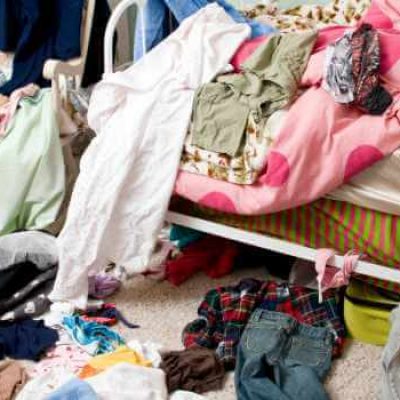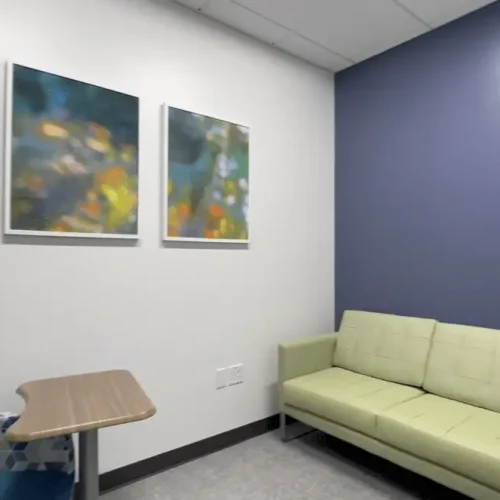Hoarding Disorder Teen and Adolescent Treatment, Therapy, and Counseling Program in Dallas, Texas
Call BasePoint Academy for immediate support for teen hoarding disorder treatment in Dallas, Texas. We’re committed to optimal adolescent development and sound psychological health for Texas youth. Our rehabilitation centers in Arlington, Forney, and McKinney specialize in treating a range of conditions, including hoarding disorder.
Does your child have difficulty discarding possessions or surround themselves with excessive clutter? Teen hoarding disorder symptoms can be effectively addressed through early intervention. Our outpatient treatment centers’ teams of specialists use evidence-based, holistic care to address the profound intersection of hoarding and mental health. What is a hoarding disorder? Keep reading for answers to this common question and learn how to access exceptional adolescent therapy for hoarding disorder in Dallas, Texas.
What Is Teen Hoarding Disorder?
Teen hoarding disorder is when adolescents struggle with obsessive accumulation of items and an emotional attachment to objects. It stems from a fear of throwing things away, impacting daily functioning and mental health. While hoarding is recognized as a distinct mental health condition, hoarding and OCD are often linked. It’s still classified within the “obsessive-compulsive disorder spectrum.”
The teen experiences significant distress at the thought of discarding items. This condition can result in feelings of shame, isolation, and family conflict as the clutter impacts shared living areas. Teens with hoarding disorder may hold onto items most would consider trash, such as broken toys, empty containers, or old papers. Deep emotional ties drive this excessive saving of useless items to objects or the belief they might need them someday. Over time, living in hoarded spaces can become unsafe and challenging to navigate.
Hoarding disorder often begins in adolescence, around ages 15 to 19, and tends to worsen with age. Its causes are unclear, but genetics, brain function, and stressful life events, such as losing a loved one, may play a role. Personality traits like difficulty with decision-making, organization, problem-solving, and a family history of the disorder are key risk factors. The current estimated prevalence of hoarding disorder in children and adolescents is around two percent, with high comorbidity rates.
While there is no definitive cure for hoarding disorder, treatment programs can significantly reduce symptoms and help adolescents manage their behaviors. With the proper therapy and support, many teens can develop healthier coping skills and improve their quality of life, thereby reducing excessive clutter.
Insurance Coverage for Teen Hoarding Disorder
Our complimentary assessment with a licensed clinician will provide you with a recommendation for the appropriate level of care for your teen struggling with hoarding disorder. We can also check your insurance coverage levels.
Call us today to schedule a complimentary same-day assessment at (972) 357-1749 or complete our inquiry form.
Teen Hoarding Disorder Treatment Admissions
Contact BasePoint Academy Today
Contact us today to schedule a free confidential assessment for your teen with a licensed clinician.
You can also get in touch to talk with our mental health experts about treatment needs, care options and your insurance coverage levels.
Call: (972) 357-1749Check Your InsuranceWhat Are Teen Hoarding Disorder Symptoms and Signs?
Some common signs of hoarding disorder in teenagers include:
- Difficulty discarding or parting with possessions, regardless of their actual value
- Excessive accumulation of items, resulting in cluttered rooms
- Inability to use spaces for their intended purposes, such as kitchens or bedrooms
- Emotional distress, including anxiety or sadness, at the idea of discarding items
- Strong attachment to possessions, believing they may have future use or sentimental value
- Procrastination or indecision about organizing or discarding items
- Social isolation or embarrassment, avoiding friends or family visits due to clutter
- Difficulty completing daily tasks, such as cleaning, due to overwhelming clutter
- Safety hazards in the home, including blocked exits, fire risks, or unsanitary conditions
- Significant impairment in daily functioning, affecting relationships, schoolwork, or health
Hoarding and anxiety often go hand in hand, with the clutter creating an overwhelming sense of chaos and stress. Over time, hoarding disorder levels can escalate, ranging from minor clutter to severe impairment of daily life. A teen might struggle to complete homework in a cluttered room or face embarrassment that keeps them from inviting friends over. If these behaviors interfere with a teen’s ability to function, seeking professional psychological help for hoarding disorder can provide much-needed guidance and support.

Statistics and Information on Teen Hoarding Disorder for Texas Families
Hoarding disorder affects approximately two percent of adolescents, with symptoms often linked to indecision, inattention, poor memory, and comorbid conditions. While hoarding behaviors are observed in various anxiety disorders, including generalized anxiety disorder and social phobia, research suggests no direct connection to increased OCD severity or poorer treatment outcomes in youth.
As adolescents typically live under parental control, restrictions on personal space and freedom at home can influence how hoarding behaviors develop and manifest. These dynamics may limit the impact of hoarding but can also complicate its identification and management. Understanding these factors is key to providing effective support and intervention for teens struggling with hoarding disorder.
Do Adolescent-Focused Mental Health Centers Provide Treatment for Hoarding Disorder?
Yes, many adolescent-focused mental health treatment centers, including BasePoint Academy, provide treatment for hoarding disorder. These behavioral health centers often offer cognitive behavioral therapy for hoarding, which helps teens recognize and question thoughts and beliefs about acquiring and keeping items. Recovery centers may also provide organizing and decluttering help, teaching essential skills to maintain a healthy, organized space.
Many hoarding treatment centers also engage families in the treatment process, ensuring a supportive environment for long-term success. Through tailored care plans, teenagers can gain confidence and learn to create a balanced, clutter-free environment that supports their mental well-being. Reach out to BasePoint Academy today to learn more about our day treatment programs, which effectively address hoarding disorder.
Types of Hoarding Disorder Treatment Programs for Teens and Adolescents in Dallas, Texas
Teen hoarding disorder treatment in Dallas, Texas, provides the necessary help for adolescents struggling with compulsive hoarding behaviors. Below are examples of available treatment programs—this is not a complete list, but it highlights common approaches that effectively help with teenage hoarding disorder. Contact BasePoint Academy for a free assessment to determine the most suitable treatment program for your child.
Hoarding Intervention Programs
Hoarding intervention programs help teens address the emotional and behavioral challenges tied to excessive clutter. These programs often combine hoarding disorder therapy, such as Cognitive Behavioral Therapy (CBT), practical organizing strategies, and family support, to create a structured plan for change. They focus on empowering teens to build healthier habits and maintain a functional living space.
Outpatient and Evening Treatment Programs
Outpatient treatment centers and therapy clinics offer flexible options for teens needing support with hoarding disorder. Outpatient and evening treatment programs allow adolescents to attend therapy sessions and receive guidance while maintaining their daily routines. These programs provide flexibility and a balance of professional care and convenience.
Inpatient and Residential Treatment
For severe cases of hoarding disorder, a residential treatment facility or inpatient treatment center can provide structured, round-the-clock care. These programs offer a safe, supportive environment where teens can focus on intensive therapy, develop healthier habits, and address the root causes of compulsive hoarding behaviors. Residential care ensures a comprehensive approach to lasting recovery.
Online Therapy or Teletherapy Programs
Online therapy or teletherapy programs don’t require attending a healthcare facility. They provide a convenient way for teens to access hoarding disorder therapy from home. These virtual sessions connect adolescents with licensed therapists who can help them address their behaviors, develop coping strategies, and build organizational skills in a flexible, supportive virtual environment.
Intensive Outpatient Program (IOP)
An Intensive Outpatient Program (IOP) can be an excellent option for teens needing structured care while managing their daily responsibilities. These programs often include hoarding disorder support groups, individual therapy, and skill-building sessions. Teens can share experiences, gain peer support, and learn effective strategies to overcome the challenges of hoarding disorder.
Partial Hospitalization Program (PHP) and Day Treatment
Partial Hospitalization Programs (PHPs) and day treatment options at a medical treatment center or related healthcare facility offer teens comprehensive care for hoarding disorder without requiring overnight stays. These programs provide intensive therapy, skill-building, and emotional support in a structured setting. They assist adolescents in addressing underlying issues while they maintain a connection to their home environment.
Types of Counseling and Therapy for Teen Hoarding Disorder in Dallas, Texas

Is your teen struggling with home clutter and hoarding disorder? There are several counseling and therapy options available. Adolescent therapy for hoarding disorder in Dallas, Texas, focuses on addressing emotional triggers, building organizational skills, and creating healthier habits. Below are examples of therapy types that can support your teen’s recovery—this is not an exhaustive list.
Acceptance and Commitment Therapy (ACT)
Acceptance and Commitment Therapy (ACT) helps teens with hoarding disorder by encouraging them to accept difficult emotions and thoughts without letting them control their behaviors. This approach focuses on mindfulness and helps teens commit to actions that align with their values. This includes creating a clutter-free space, even when faced with the anxiety or distress that hoarding may cause.
Group and Family Therapy
Group and family therapy can be invaluable, providing a supportive environment for the teen and their loved ones. In group therapy, your teen can connect with others facing similar struggles, while family therapy helps improve communication and understanding at home. These therapies promote healthier dynamics and reinforce the skills to manage hoarding behaviors.
Motivational Interviewing (MI)
Motivational Interviewing (MI) is a client-centered therapy that helps teens with hoarding disorder explore and resolve ambivalence about making changes. Through open, non-judgmental conversations, MI encourages your teen to find their motivation for decluttering and improving their living space. This approach fosters a sense of autonomy, helping your teen take positive steps toward lasting change.
Cognitive Behavioral Therapy (CBT)
Cognitive behavioral therapy for hoarding is an effective, first-line approach that helps teens recognize and change the thought patterns contributing to compulsive hoarding behaviors. CBT helps your teen develop healthier habits, reduce clutter, and learn practical strategies for organizing their space by addressing the underlying emotions and beliefs related to the excess saving of useless items.
Compassion-Focused Therapy (CFT)
Compassion-Focused Therapy (CFT) helps teens with hoarding disorder by addressing feelings of shame and self-criticism often tied to their behavior. This approach encourages your teen to develop self-compassion and resilience, creating a supportive foundation for positive changes. CFT empowers teens to approach their struggles with kindness, reducing emotional barriers to recovery.
BasePoint Academy Accepts health Insurance
We accept most major health insurance providers in Texas and can check your treatment coverage levels on your behalf.
Adolescent and Teen Hoarding Disorder Treatment in Dallas, Texas
BasePoint Academy, with multiple facilities in and near Dallas, Texas, offers specialized care for teens struggling with hoarding disorder. As a holistic treatment center, we address the emotional and behavioral aspects of hoarding, helping adolescents develop healthier habits and improve their overall well-being. If your teen needs support, contact us today to learn how we can help.
- Arlington, Texas: 3900 Arlington Highlands Blvd, Suite 237, Arlington, TX 76018
- Forney, Texas: 713 W Broad St, Suite 200, Forney, TX 75126
- Frisco, Texas: 8275 Judges Way, Suite 100I, Frisco, TX 75036
- McKinney, Texas: 4733 Medical Center Drive, McKinney, TX 75069

Teen Hoarding Disorder Treatment Program in Arlington, Texas
Nestled between Dallas and Fort Worth, Arlington, Texas, stands out for its vibrant mix of business, education, and entertainment opportunities. It boasts attractions like the University of Texas at Arlington, the Dallas Cowboys, and Six Flags. Teens facing challenges with hoarding disorder can find specialized treatment programs in Texas’ seventh largest city.
- BasePoint Academy – Arlington, Texas: 3900 Arlington Highlands Blvd, Suite 237, Arlington, TX 76018, United States
Teen Hoarding Disorder Treatment Program in Forney, Texas
Located just twenty miles east of Dallas in Kaufman County, Forney, Texas, blends small-town appeal with contemporary conveniences. As part of the Dallas–Fort Worth Metroplex, Forney provides a welcoming environment for families prioritizing mental health care. Teens struggling with hoarding and anxiety can explore tailored treatment options to improve emotional regulation and strengthen social connections.
- BasePoint Academy – Forney, Texas: 713 W Broad St, Suite 200, Forney, TX 75126, United States
Teen Hoarding Disorder Treatment Program in McKinney, Texas
Approximately thirty miles north of Dallas in Collin County, McKinney is a thriving city celebrated for its close-knit community and welcoming environment. As part of the Dallas–Fort Worth Metroplex, McKinney provides families with access to exceptional mental health services. Teens facing challenges with hoarding disorder can find specialized care to foster emotional balance and strengthen interpersonal skills.
- BasePoint Academy – McKinney, Texas: 4733 Medical Center Drive, McKinney, TX 75069, United States
Alternative Ways to Find Hoarding Disorder Therapy and Treatment for Teens Near Me
Finding the proper help with teenage hoarding disorder doesn’t have to be challenging. There are steps you can take to connect with quality care. Begin by searching online for centers specializing in adolescent mental health, using terms like “Teen hoarding disorder treatment in Dallas, TX” or “adolescent therapy for hoarding disorder near me.”
Ensure the centers you’re considering are accredited and employ licensed professionals. For instance, BasePoint Academy is accredited by respected organizations like The Joint Commission, reflecting our commitment to delivering ethical, high-quality care. Accreditation ensures your teen will receive treatment in a safe, professional environment.
Explore the available treatment options, including outpatient or day treatment programs. If you suspect your teen is dealing with co-occurring disorders, look for dual diagnosis treatment centers. Confirm that evidence-based methods, such as Cognitive Behavioral Therapy (CBT), are part of the treatment centers’ approach. Review your insurance coverage to understand costs and consider visiting facilities to evaluate their resources and atmosphere. You can also browse mental health directories and trusted review platforms like Yelp and the Better Business Bureau.
If you’re uncertain of where to begin, contact BasePoint Academy. We’re connected to a network of treatment providers in the Lone Star State and can guide you to the most suitable care for your teen. We’ll conduct a free assessment to aid you in your decision-making. Call (972) 357-1749 today.
What Is the BasePoint Difference?

7am to 7pm CST
7 Days a Week

Full Time Physican
On Site

We Transport
To and From

Therapy Involving
the Whole Family

Family
Owned

Contact BasePoint Academy Today
Contact us today to schedule a free confidential assessment for your teen with a licensed clinician.
You can also get in touch to talk with our mental health experts about treatment needs, care options and your insurance coverage levels.
Call: (972) 357-1749Check Your InsuranceDoes Health Insurance Cover Teen Hoarding Disorder Therapy and Treatment Programs in Dallas-Fort Worth?
Yes, many health insurance plans cover programs for teen hoarding disorder treatment in Dallas-Fort Worth. Coverage often includes counseling, cognitive behavioral therapy, and outpatient programs. It’s essential to check your insurance benefits to understand what’s covered and whether prior authorization is required for specific treatments.
Insurance plans vary widely, so contacting your insurer or the treatment center can help clarify the details. Some specialty treatment centers, like BasePoint Academy, offer insurance verification services to simplify the process and ensure your teen gets the necessary care without unnecessary delays. Be sure to ask about copayments, deductibles, and out-of-pocket expenses.

How Much Does Adolescent Hoarding Disorder Treatment Cost Without Health Insurance Coverage in Texas?
The cost of adolescent hoarding disorder treatment without health insurance coverage in Texas can vary widely, typically ranging from $100 to $250 or more per therapy session, depending on multiple elements. This can add up quickly, especially for comprehensive treatment plans that include therapy, skills training, and ongoing support.
Additional costs may include assessments, family counseling, and specialized services. Some treatment centers offer payment plans or financial counseling to help families manage these expenses. It’s important to research different programs and inquire about available financial options. If you’re concerned about affordability, contacting behavioral health centers like BasePoint Academy can provide more details about costs and potential support.
How Much Does Teen Hoarding Disorder Therapy Cost with Health Insurance Coverage Near Me?
The cost of teen hoarding disorder therapy with health insurance coverage can vary based on your plan and provider. You may only be responsible for a copay or a percentage of the total cost. Factors influencing your out-of-pocket expenses include the type of coverage you have and whether the rehabilitation center is in-network.
Confirm your insurance benefits and check if the facility accepts your insurance plan to get an accurate estimate. Many treatment centers, including BasePoint Academy, assist with insurance verification to help you understand coverage and potential out-of-pocket costs.
Contact BasePoint Academy Today
Contact us today to schedule a free confidential assessment for your teen with a licensed clinician.
You can also get in touch to talk with our mental health experts about treatment needs, care options and your insurance coverage levels.
Call: (972) 357-1749Check Your InsuranceWhat Is the Admissions Process for Teen Hoarding Therapy and Treatment at BasePoint Academy?
The admissions process for teen hoarding therapy and treatment at BasePoint Academy is structured to provide families like yours with clarity and support while ensuring personalized care for your teen. This compassionate, comprehensive approach ensures your teen receives the care and tools they need to overcome hoarding behaviors and build a healthier future. Here’s a step-by-step overview:
- Initial Contact: Begin by reaching out to BasePoint Academy via phone or our contact page. Our admissions team will answer your questions and gather preliminary information about your teen’s challenges with hoarding disorder.
- Intake Assessment: Your teen will undergo a thorough intake assessment by licensed professionals. This evaluation helps identify specific needs, underlying causes, and the impact of compulsive hoarding behaviors on daily life.
- Evaluation and Diagnosis: A formal diagnosis is made based on the assessment, considering any co-occurring mental health concerns that may require attention alongside hoarding disorder.
- Personalized Treatment Plan Development: Our team collaborates with you and your teen to develop a treatment plan tailored to their unique needs. This plan outlines therapy approaches, goals, and program structure, focusing on practical skills for managing excessive clutter and emotional stressors.
- Insurance Verification and Financial Counseling: We work with your insurance provider to confirm coverage details and offer financial counseling to clarify any out-of-pocket costs, ensuring transparency from the very beginning.
- Admission Approval: Once all necessary steps are completed, our team confirms your teen’s acceptance into the program and schedules a start date.
- Family Orientation: You and your teen can attend an orientation session. This will help you understand your role in the therapeutic process and provide tools to support your teen’s progress.
- Admittance to the Program: Your teen is formally admitted and begins attending therapy sessions and other program components, such as skill-building workshops and group activities.
- Ongoing Monitoring and Adjustments: Throughout the program, our team monitors progress and adjusts the treatment plan as necessary to meet your teen’s evolving needs.
What Happens in a Teen Hoarding Disorder Treatment Program?
A teen hoarding disorder treatment program focuses on addressing the underlying causes of hoarding behaviors and equipping teens with healthier coping skills. At an integrative treatment center like BasePoint Academy, therapies are tailored to meet the unique needs of adolescents, blending evidence-based practices like cognitive behavioral therapy for hoarding with practical support for managing clutter and decision-making.
These programs help teens understand the emotional and behavioral patterns contributing to their fear of throwing things away. They provide tools to create lasting, positive change. Treatment often includes individual and group therapy, skills training, and family involvement to foster a supportive environment. Cognitive behavioral therapy for hoarding plays a key role, teaching teens how to challenge thoughts tied to difficulty discarding possessions and gradually letting go of unnecessary items. By building emotional resilience and organizational skills, teens gain the confidence to manage their behaviors and live a more balanced life.

Contact The BasePoint Academy Today!
Does your teen display signs and symptoms of hoarding disorder? If you are concerned about your teenager’s mental health, contact BasePoint Academy for an assessment and treatment recommendations for your teen.
Sources
- World Health Organization. (n.d.). Mental health of adolescents. World Health Organization. Retrieved from https://www.who.int/news-room/fact-sheets/detail/adolescent-mental-health on July 11, 2023
- Horowitz, J. M. (2019, February 20). Most U.S. teens see anxiety and depression as a major problem among their peers. Pew Research Center’s Social & Demographic Trends Project. Retrieved from https://www.pewresearch.org/social-trends/2019/02/20/most-u-s-teens-see-anxiety-and-depression-as-a-major-problem-among-their-peers/ on July 11, 2023
Statistics on Teen Hoarding Disorder for Texas Families
- Hoarding disorder is estimated to affect two percent of the adolescent population.
- A study published in the Journal of the American Academy of Child and Adolescent Psychiatry on hoarding symptoms in children and adolescents with obsessive-compulsive disorder found no evidence linking hoarding to increased OCD severity or poorer treatment response in these young individuals.
- Prevalence estimates suggest that hoarding disorder affects around 2.5% of the working-age population, with some evidence indicating that its occurrence increases as individuals age.
- Hoarding behaviors have been observed in individuals with anxiety disorders beyond OCD, especially those diagnosed with generalized anxiety disorder or social phobia. Major depressive disorder is also found to be more common in individuals with hoarding disorder compared to those with OCD.
- Hoarding symptoms in children and adolescents are linked to limited insight, difficulty with decision-making, inattention, poor memory, impaired problem-solving and planning, heightened avoidance, and comorbid conditions such as Tourette’s disorder and ADHD.
- Parental control over living spaces and limited freedom at home likely influence and restrict the characteristics and outcomes of hoarding behavior in young individuals.







